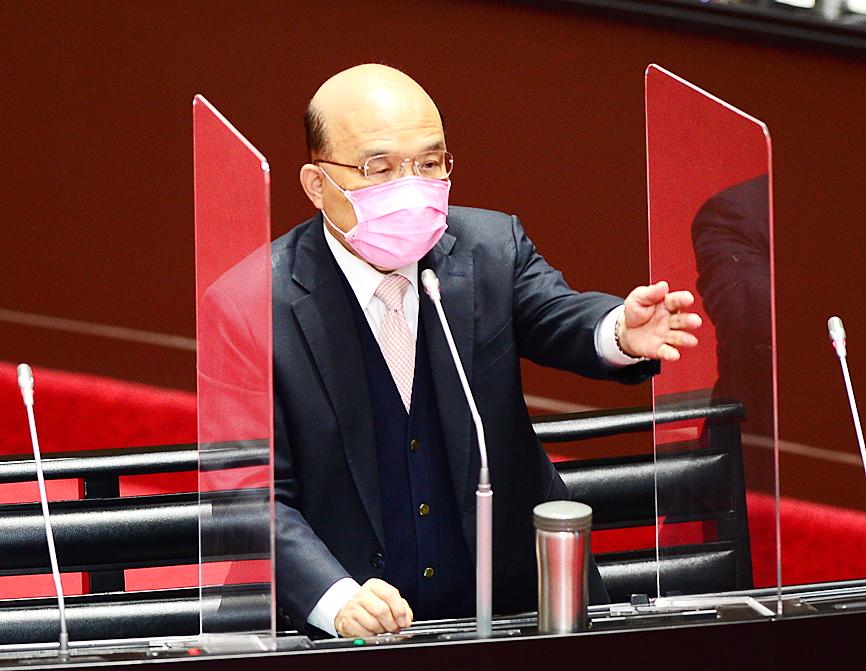Premier Su Tseng-chang (蘇貞昌) and other top Democratic Progressive Party (DPP) officials yesterday condemned Beijing after it announced that they had been placed on a no-entry list and would be subject to further sanctions.
China’s Taiwan Affairs Office spokeswoman Zhu Fenglian (朱鳳蓮) said that Taiwanese independence advocates and their family members would face life-long legal consequences should they set foot in China, including Hong Kong and Macau, or conduct business with entities there.
It was the first time China announced concrete sanctions against who it calls supporters of Taiwanese independence.

Photo: Wang Yi-sung, Taipei Times
The office named Su, Legislative Speaker You Si-kun (游錫堃) and Minister of Foreign Affairs Joseph Wu (吳釗燮) as part of “an extremely small minority of diehard Taiwanese separatists who caused extreme harm ... to the fundamental interests of the Chinese race.”
China would also take “any other necessary measures” against these people, Zhu said.
She said that the message China wants to send to supporters of Taiwanese independence is: “Those who forget their ancestors, betray the motherland and split the country will never end up well and will be spurned by the people and judged by history.”
During a plenary session at the legislature, DPP Legislator Chen Ting-fei (陳亭妃) asked Su to comment on the news before congratulating him for being a “Beijing-certified Taiwanese patriot.”
Su replied: “These foreigners are meddling in Taiwan’s domestic affairs. I fight for Taiwan and I will not give in to intimidation for doing the right thing.”
Separately, You said: “China’s Xinhua news agency is yet again raising my international recognition, and I must say I am quite proud of it; Miss Zhu has my sincere thanks.”
“However, I have no plans to run for office and she should not trouble herself with me,” he added.
China last year said it was compiling a global watch list of Taiwanese independence supporters, adding that those on the list would be punished.
The sanctions announced yesterday are likely to have little effect on the Taiwanese politicians, as they are unlikely to travel to China.
China has ratcheted up military, economic and diplomatic pressure on Taiwan since President Tsai Ing-wen (蔡英文) took office in 2016 after a campaign many understood to be in support of Taiwanese independence.
Additional reporting by Bloomberg

PREPAREDNESS: Given the difficulty of importing ammunition during wartime, the Ministry of National Defense said it would prioritize ‘coproduction’ partnerships A newly formed unit of the Marine Corps tasked with land-based security operations has recently replaced its aging, domestically produced rifles with more advanced, US-made M4A1 rifles, a source said yesterday. The unnamed source familiar with the matter said the First Security Battalion of the Marine Corps’ Air Defense and Base Guard Group has replaced its older T65K2 rifles, which have been in service since the late 1980s, with the newly received M4A1s. The source did not say exactly when the upgrade took place or how many M4A1s were issued to the battalion. The confirmation came after Chinese-language media reported

The Taiwanese passport ranked 33rd in a global listing of passports by convenience this month, rising three places from last month’s ranking, but matching its position in January last year. The Henley Passport Index, an international ranking of passports by the number of designations its holder can travel to without a visa, showed that the Taiwan passport enables holders to travel to 139 countries and territories without a visa. Singapore’s passport was ranked the most powerful with visa-free access to 192 destinations out of 227, according to the index published on Tuesday by UK-based migration investment consultancy firm Henley and Partners. Japan’s and

A Ministry of Foreign Affairs official yesterday said that a delegation that visited China for an APEC meeting did not receive any kind of treatment that downgraded Taiwan’s sovereignty. Department of International Organizations Director-General Jonathan Sun (孫儉元) said that he and a group of ministry officials visited Shenzhen, China, to attend the APEC Informal Senior Officials’ Meeting last month. The trip went “smoothly and safely” for all Taiwanese delegates, as the Chinese side arranged the trip in accordance with long-standing practices, Sun said at the ministry’s weekly briefing. The Taiwanese group did not encounter any political suppression, he said. Sun made the remarks when

BROAD AGREEMENT: The two are nearing a trade deal to reduce Taiwan’s tariff to 15% and a commitment for TSMC to build five more fabs, a ‘New York Times’ report said Taiwan and the US have reached a broad consensus on a trade deal, the Executive Yuan’s Office of Trade Negotiations said yesterday, after a report said that Washington is set to reduce Taiwan’s tariff rate to 15 percent. The New York Times on Monday reported that the two nations are nearing a trade deal to reduce Taiwan’s tariff rate to 15 percent and commit Taiwan Semiconductor Manufacturing Co (TSMC, 台積電) to building at least five more facilities in the US. “The agreement, which has been under negotiation for months, is being legally scrubbed and could be announced this month,” the paper said,